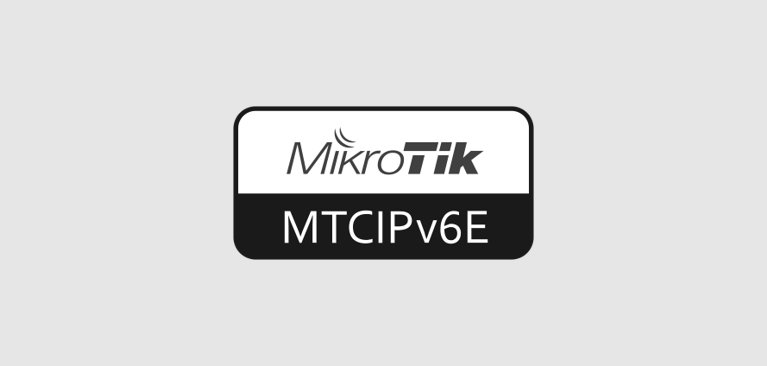
MikroTik Certified IPv6 Engineer Certification (MTCIPv6E)
The Mikrotik Training Academy offers interested parties from all over the world the opportunity to gain experience and to find out more about MikroTik products and technologies. The MikroTik training program consists of courses that are held worldwide by official MikroTik certified trainers. Participation in these courses therefore also offers the opportunity to receive professional certification in various MikroTik product technologies.
The MikroTik Certified IPv6 Engineer (MTCIPv6E) course is aimed at administrators, network engineers and technicians who want to set up or convert company networks or client CPE integration based on IPv6. Part of the course are practical exercises with a training kit so that you can apply the knowledge you have acquired straight away. The exam to be passed is a central online test specified by MikroTik.
If you pass the exam, you will receive an official certificate from MikroTik. After completing the course, you will be familiar with the IPv6 protocol and be able to implement IPv6 networks.
Language : This course is multilingual and is held in German and English.
Kursinhalt
Module 1 Inroduction to IPv6
- IPv6 address
- Differences between IPv4 and IPv6
- Address distribution
- Address notation
- SLAAC IPv6 address creation (EUI-64)
- Subnetting
- Address types
- Link-local
- Global
- Multicast
- Anycast
- Unique local
- Special addresses
- Reserved IPv6 addresses
- Module 1 laboratory
Module 2 IPv6 Protocol
- Address configuration
- Auto-configuration
- Stateless – SLAAC, DHCPv6
- Stateful – DHCPv6
- Neighbor discovery protocol
- IPv6 routing basics
- IPv6 prefix
- Module 2 laboratory
Module 3 IPv6 Packet
- IPv6 header
- Header field description
- Next header (daisy chaining)
- Fragmentation
- Path MTU discovery
- Module 3 laboratory
Module 4 IPv6 Security
- ICMPv6
- Neighbor discovery protocol
- Router solicitation
- Router advertisement
- Neighbor solicitation
- Duplicate address detection
- Neighbor unreachability detection
- Neighbor advertisement
- ‘Managed address configuration’ flag
- Other configuration’ flag
- Redirect
- MLD (Multicast Listener Discovery)
- Temporary addresses
- Firewall
- IPsec
- Header only encryption (AH)
- Data only encryption (ESP)
- Header and data encryption (AH+ESP)
- Module 4 laboratory
Module 5 IPv6 Packet
- Dual stack (RIPE recommended)
- 6to4
- 6RD
- Teredo
- DS-lite (Dual stack lite)
- Module 5 laboratory
Module 6 Interoperability
- DIPv6 pool
- DHCP
- DHCP PD server
- DHCP PD client
- DHCPv6 client
- IPv6 tunnels
- IPIPv6
- EoIPv6
- GRE6
- IP version agnostic
- DNS
- Reverse DNS
- NTP
- PPP IPv6 support
- Routing
- Using global addresses as in IPv4
- Using link-local addresses as in IPv6
- RouterOS features not yet available for IPv6
- NAT
- HotSpot
- RADIUS integration
- Policy routing
- DHCPv6 server
- Tools
- Ping
- Traceroute
- Torch
- Traffic generator
- Netwatch
- Traffic flow
Module 7 laboratory
- * Preisangaben: zzgl. der gesetzlichen Mehrwertsteuer
- Voraussetzungen für Teilnahme: MTCNA
- Weitere enthalten Leistungen:
Tagungs-/Schulungsunterlagen, Mittagessen, Pausenerfrischungen
- zusätzliche Information:
Hotelbuchungen sind separat zu tätigen. Die Kursunterlagen sowie der Online-Multiple-Choice-Test sind in Englisch.
Hourly Schedule
Day 1 - Day 2
- 9 clock - 17 o'clock
- Module 1 Inroduction to IPv6
- (For details see course content)
- 9 clock - 17 o'clock
- Module 2 IPv6 Protocol
- (For details see course content)
- 9 clock - 17 o'clock
- Module 3 IPv6 Packet
- (For details see course content)
- 9 clock - 17 o'clock
- Module 4 IPv6 Security
- (For details see course content)
- 9 clock - 17 o'clock
- Module 5 IPv6 Packet
- (For details see course content)
- 9 clock - 17 o'clock
- Module 6 Interoperability
- (For details see course content)
- 9 clock - 17 o'clock
- Module 7 laboratory
- (For details see course content)

